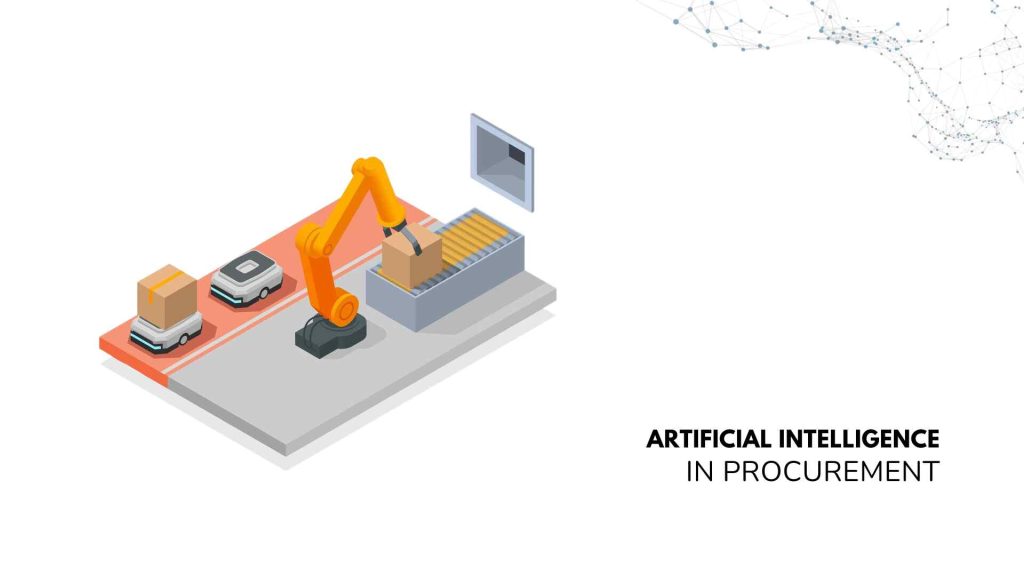Integrating artificial intelligence (AI) in various sectors has transformed traditional practices, and procurement is no exception. The utilization of AI in procurement introduces a wave of innovation, efficiency, and strategic decision-making that revolutionizes how businesses manage their supply chains and sourcing processes. Let’s delve into artificial intelligence (AI) in procurement, exploring its definition, examples, types, benefits, and challenges.
What is Artificial Intelligence in Procurement?
Artificial intelligence in procurement refers to using cutting-edge technologies, such as natural languages processing(NLP), machine learning, and data analytics, to automate, optimize, and enhance various facets of the procurement process. AI systems are designed to interpret data, identify patterns, make predictions, and facilitate smarter decision-making, ultimately optimizing procurement operations.
Examples of Procurement AI
Predictive Analytics: AI-driven predictive analytics helps forecast demand, market trends, and potential risks, enabling organizations to make proactive and informed procurement decisions.
Supplier Relationship Management (SRM): AI assists in evaluating supplier performance risk assessment and suggests alternate suppliers based on documented data and present market trends.
Cognitive Sourcing: Through natural language processing, AI tools aid in understanding complex sourcing requirements, matching them with the right suppliers, and automating the negotiation process.
Types of Procurement AI
Machine Learning Algorithms: These algorithms improve over time, understanding from documented data to forecast coming trends and patterns.
Robotic Process Automation (RPA): RPA streamlines repetitive tasks, such as data entry and invoice processing, decreasing manual effort and mistakes.
Cognitive Procurement Solutions: These solutions employ NLP and cognitive computing to understand and process unstructured data, enhancing decision-making processes.
Benefits of AI in Procurement
Enhanced Efficiency and Accuracy: AI streamlines routine tasks, reducing errors and enabling faster and more accurate decision-making.
Cost Savings and Strategic Insights: Predictive analytics and market trend analysis help optimize cost and provide strategic insights for negotiations and sourcing.
Risk Management and Compliance: AI helps identify potential risks and ensures compliance by evaluating supplier performance and monitoring contract compliance.
Challenges of AI in Procurement
Data Quality and Integration: Ensuring data quality and seamless integration across different systems can challenge effective AI implementation.
Change Management and Skills Gap: Adapting to AI-driven processes requires a shift in organizational culture and may necessitate upskilling employees to leverage these technologies effectively.
Ethical and Bias Concerns: AI systems might inadvertently perpetuate biases in historical data, leading to ethical concerns in decision-making.
Key Applications of Artificial Intelligence in Procurement
Demand Forecasting and Inventory Management: AI helps in predicting demand, optimizing inventory levels, and reducing excess inventory or stockouts.
Dynamic Pricing and Negotiation: AI aids in active pricing strategies by analyzing market conditions, competitor pricing, and historical data, facilitating optimized negotiations.
Common Misconceptions of Artificial Intelligence in Procurement
AI Replaces Human Expertise: Contrary to the misconception that AI replaces human roles. It complements human expertise, empowering professionals to focus on strategic and complex tasks.
AI Implementation is Costly and Complex: While initial implementation may involve investment and complexities. The long-term benefits of Artificial Intelligence in procurement, including cost savings and enhanced efficiency, outweigh the initial challenges.
As AI continues to evolve, its integration into procurement processes promises to reshape the future of supply chain management. Empowering businesses to make data-driven decisions, achieve cost efficiencies, and drive strategic value. Embracing the potential of AI in procurement is not just a competitive advantage. It’s a necessity in today’s dynamic business environment.

Vijay comes with a vast experience in ERP and enterprise solutions space with about 20 years of experience in various packaged application like Acumatica, SAP, Orion, Salesforce.com, SugarCRM and, SalesLogix.

